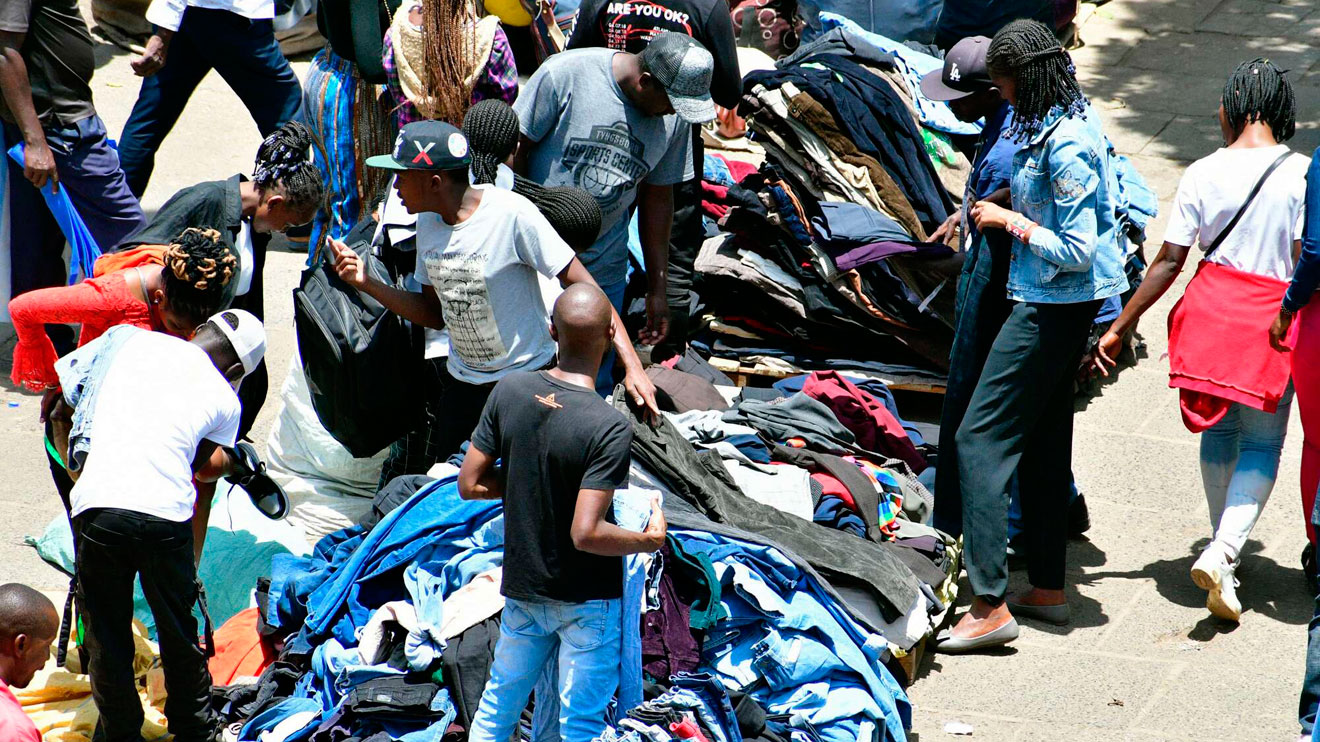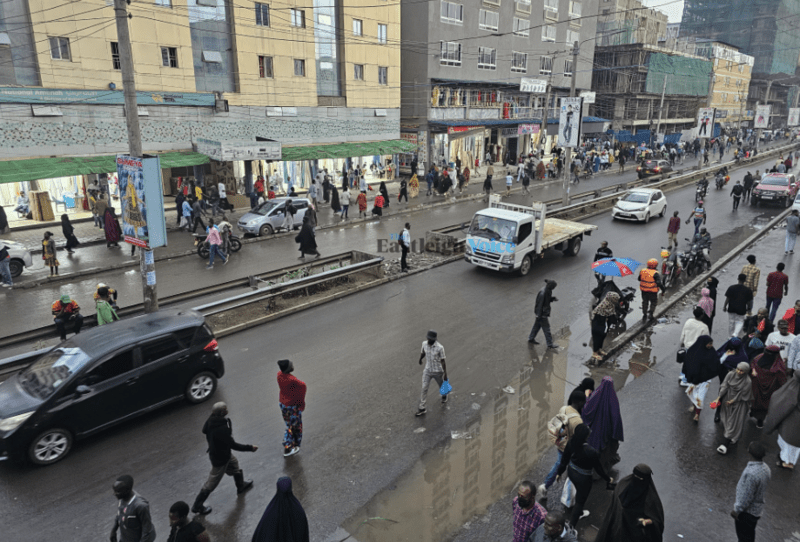How attempts to solve govt-hawker wrangles have flopped

To survive, hawkers are usually involved in fierce cat-and-mouse games with the enforcement officers along Ronald Ngala and Mfangano streets.
As early as 7 am, hawkers always spread their wares along various streets, lanes, and avenues within the Nairobi Central Business District (CBD), targeting commuters, passersby, and other customers.
Hawking is a profession and livelihood for millions of self-employed Kenyans in the Jua Kali sector. However, in their efforts to make ends meet, the hawkers end up blocking roads and pavements, hence causing human traffic.
More To Read
- Equality Commission condemns Geoffrey Mosiria for 'exploiting vulnerable street child', calls for action
- Saba Saba: CS Murkomen expresses regret over Nairobi lockdown, emphasises security first
- Saba Saba: Raila Odinga skips Kamukunji rally, blames police blockades
- We no longer trust police: Nairobi traders arm themselves to protect shops from looters
- Protests turn chaotic in Nairobi CBD, several rushed to KNH
- CBD vehicle ban sparks outcry from Motorists Association of Kenya
In response to allegations that they make the city inaccessible, hawkers accuse the government of making endless unfulfilled promises to create conducive working environments for them. Conversely, the government argues that the hawkers wreak havoc in the city.
To survive, hawkers are usually involved in fierce cat-and-mouse games with the Nairobi County askaris, also known as Kanjo, along Ronald Ngala and Mfangano streets and Latema and River roads.
Over the years, efforts to evict them or relocate them to other areas have failed, despite vigorous attempts by successive county governments. Heavy-handed roundups have not worked either.
Hawking in Nairobi
Hawking has deep connections to World War II and Kenya's State of Emergency. Writer Claire Robertson notes in her 2007 essay published in Volume 11 of Crime, History, and Society that the population in Nairobi escalated from 41,000 to 70,000 in two years to 1941, despite widespread use of kipande, passports, passes, and permits to control the influx of opportunists and curb Africans from ganging up against the British.
The influx mostly affected shopkeepers, especially males, as "gendered class formation was a conscious aim of British administration."
Robertson further tells us that, "While the Nairobi Municipal Council was not willing to forbid hawking altogether, it adopted a policy of gradually widening the number of commodities that required licences to sell."
The reduction in the number of hawkers from 500 to 300 did not help matters and "neither the underground economy nor the militancy of hawkers disappeared at the end of World War II, when the internal socio-economic crisis became more evident and acute, resulting in part in an escalated hawker war." The lack of access to banking services and permanent trading places only worsened the situation, which was accentuated when women were banned from hawking.
However, protests from those peddling uji saw the ban lifted and women, mostly from Kiambu and Thika, gradually flocked to the city, making women cogs in the hawking wheel.
There were markets then: Kariokor Market, Shauri Moyo Market, Jericho Market, the City Market, and the Wakulima Market, then called Mincing Lane Market. Mincing Lane is a street in England famous for tea auctions.
The coffee auctions in Nairobi were along Mincing Lane, where the Kenya Planters Union headquarters still stands next to Wakulima Market, nicknamed 'Marikiti,' due to the Kikuyu community's difficulty in pronouncing the word market.
 Nairobi Governor Johnson Sakaja during a meeting with the National Government Nairobi Security team on March 7, 2024. (Photo: Nairobi County)
Nairobi Governor Johnson Sakaja during a meeting with the National Government Nairobi Security team on March 7, 2024. (Photo: Nairobi County)
The declaration of a state of emergency by colonial governor Sir Evelyn Baring in the seven years to 1959 only worsened the situation, besides revealing that the Mau Mau ragtag militia had two wings: the 'active' wing with fighters in the forests, and the 'passive' wing operating undercover as the 'eyes and ears' of the active wing.
From the onset, it was clear that successive governments were in the spotlight for failing to provide safe and secure trading spaces for small and medium traders. There were attempts even in 2014, during former Governor Evan Kidero's tenure, to tame the hawker problem that had become unbearable.
Former Karura MCA Abdi Mohammed even petitioned the Nairobi County Assembly over the menace. The motion, despite attracting a heated debate, was withdrawn later.
Regulations placed to govern hawkers were also stringent, with some leaders even at times accusing the sector of harbouring criminal elements. Former Nairobi Town Clerk Philip Kisia says the streets are unsafe because you can never know if all those posing as hawkers are genuine. Many times, thieves take advantage of the confusion that hawkers cause to steal from people.
"This state of affairs has left traders who own supermarkets, large-scale shops, and small kiosks hopeless. The hawkers come and occupy the space outside the entrances of their premises and sell the items sold in their shops," says Kisia.
Kisia adds, "This is unfair because while the traders with premises pay levies, the hawkers don't. Again, the hawkers occupy roads, endangering their lives and those of motorists. The good examples are the hawkers found in Ngara. Some have occupied any space within the Ngara Estate, even blocking entry to some homes. As a result, some homeowners are scared and unable to live peacefully."
However, hawkers allege that the government has always failed to look into their grievances, including continuous harassment by the askaris, which disrupts their work. Kanjos have been accused of soliciting bribes and arresting hawkers arbitrarily.
In October 2023, Nairobi Governor Johnson Sakaja criticised his inspectors for harassing street vendors in a crackdown on traders operating without the requisite county government documents.
"I have ordered the immediate release of all confiscated items, apologised to the traders and personally compensated each of them with Sh10,000 each," Sakaja said, adding that disciplinary action will be taken against officers who were deployed to the CBD.
Governor Johnson Sakaja
In his first Sh42.3 billion budget, which was passed by Nairobi MCAs, Sh100 million was allocated for the relocation of informal traders (hawkers) from the main streets.
Sakaja, in his manifesto, had also promised that his administration would not chase hawkers from their bases of operations but instead allocate them alternative areas for trading.
Last year, Sakaja, in a bid to tame the hawking menace, directed that hawkers in Nairobi's Central Business District would only be allowed to conduct business after 4 pm. The governor also allowed pop-up markets during the weekend in specific areas, but only upon payment.
"Pop-up markets are allowed upon payment of applicable rates, rent, and fees only on weekends," reads the programme. A daily cess fee will be applied to hawkers who intend to conduct vending business in the rehabilitated back lanes in the CBD.
"Street vending business operations in the rehabilitated back lanes shall be done 24 hours every day by traders designated to those lanes through applicable procedures," Sakaja stated.
 An aerial view of Yusuf Haji Avenue, where hawkers and Nairobi City County Askaris clashed in May 2024. (Photo: Abdirahman Khalif)
An aerial view of Yusuf Haji Avenue, where hawkers and Nairobi City County Askaris clashed in May 2024. (Photo: Abdirahman Khalif)
In May this year, City County askaris forcefully removed hawkers from the busy Yusuf Haji Roadroad, leading to an unusual scene of a half-empty street that on other days would be jammed with stalls.
Hundreds of hawkers sat along the pavements of the malls, watching as Kanjo officials patrolled the area. Motorists and pedestrians enjoyed the newly available space, a stark contrast to the usual congestion hawkers caused.
The Kanjo officials dismantled makeshift stalls around Seventh Street and arrested anyone who attempted to stop them or filmed their actions.
Fardosa Odowa, a divorcee who used to sell carpets in front of the Day-to-Day Shopping Centre, said she might be unable to feed her three children if the evictions continue.
"I am a divorcee and this was the only way I was making a living for my three children. It is really sad," she lamented.
Some young men who are hawkers also shared their grievances, stating that they have never experienced such treatment and are now left without work.
Abdullahi Yarow said, "Where do we go? If this continues, we won't even be able to afford food."
Qasim Abdulle, who runs a shop at the Olympic Shopping Complex, said, "You see, customers can now access my shop. Hawkers were blocking the way."
The Eastleigh Business District Association supports the eviction of hawkers from Yusuf Haji Avenue and all other roads in Eastleigh, claiming that hawkers violate an agreement that dictates they operate in Eastleigh from 5 pm. However, some hawkers have recently begun parading their wares as early as 9 am.
Mohamed Adan, the Chief Executive Officer of the Eastleigh Business District Association, told The Eastleigh Voice that hawkers might be banned permanently from Yusuf Haji Avenue.
Speaking from his office, Adan accused hawkers of not paying rent, tax, or business registration fees but still seeking the same rights as shop owners.
Eastleigh Hawkers Association Chairperson Jeff Oteba, however, argued that they have been coexisting with mall owners and traders and attributed the recent evictions to county council askaris.
"We accuse the city council askaris of highhandedness because we have co-existed with mall owners and traders for a long time after agreeing on spaces to occupy," said Oteba.
Top Stories Today














































